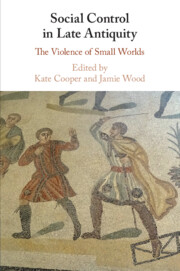Book contents
- Social Control in Late Antiquity
- Social Control in Late Antiquity
- Copyright page
- Contents
- Contributors
- Preface and Acknowledgements
- Abbreviations
- Introduction
- Part I Women and Children First
- Part II ‘Slaves, be subject to your masters’
- Chapter 5 Modelling Msarrqūtā
- Chapter 6 Constructing Complexity
- Chapter 7 Disciplining the Slaves of God
- Part III Knowledge, Power, and Symbolic Violence
- Part IV Vulnerability and Power
- Bibliography
- Index
Chapter 5 - Modelling Msarrqūtā
Humiliation, Christian Monasticism, and the Ascetic Life of Slavery in Late Antique Syria and Mesopotamia
from Part II - ‘Slaves, be subject to your masters’
Published online by Cambridge University Press: 18 September 2020
- Social Control in Late Antiquity
- Social Control in Late Antiquity
- Copyright page
- Contents
- Contributors
- Preface and Acknowledgements
- Abbreviations
- Introduction
- Part I Women and Children First
- Part II ‘Slaves, be subject to your masters’
- Chapter 5 Modelling Msarrqūtā
- Chapter 6 Constructing Complexity
- Chapter 7 Disciplining the Slaves of God
- Part III Knowledge, Power, and Symbolic Violence
- Part IV Vulnerability and Power
- Bibliography
- Index
Summary
This study demonstrates how the macrocosm of slavery, along with its violent measures of discipline and punishment, was assimilated into and reproduced by Christian ascetic culture of late antique Syria, in both urban and rural spaces. After investigating the nature of slaveholding practices in the cities and outlying villages of the region, the study asks how the type of slavery that was characteristic of Syria may have affected the ascetic practices of fourth- and fifth-century monks who lived on the fringes of cities and villages. Finally, in order to understand the ascetic afterlife of slavery in Christian Syria and Mesopotamia, the study also explores the nature and ascetic function of slavery in some later sources of the sixth and even seventh centuries. This exploration into the later centuries gauges the potency of discourses and practices of slavery. It also serves to make us aware of just how powerful, pervasive, and persistent doulological discourse and discursive shifts were in late antiquity.
Keywords
- Type
- Chapter
- Information
- Social Control in Late AntiquityThe Violence of Small Worlds, pp. 105 - 130Publisher: Cambridge University PressPrint publication year: 2020



